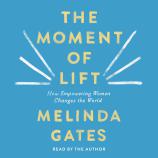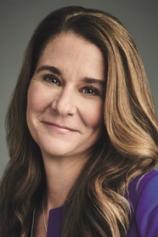Reading Group Guide
Discussion Questions
The Moment of Lift: How Empowering Women Changes the World (Audiobook)

1. In the Introduction, Melinda shares stories from her life --- watching Apollo launches as a child, and, as a mom, taking off on airplanes with her family --- that in part inspired the title of the book. How has she maintained the sense of wonder and curiosity she felt as a child in her work as a philanthropist? Can you recall any moments in your own life that elicited a similar feeling of grace and being “lifted like a scarf on the wind,” as Mark Nepo describes (2)?
2. Melinda explains that she has shared these women’s (and men’s) stories as a way to inspire us to lift each other up. In your experience, how does lift happen? Are there individuals in your life whom you feel you’ve helped to lift, in a big or small way? Who has helped lift you?
3. Each chapter of the book focuses on a central issue of gender equality, and yet taken as a whole they form a matrix of issues that support that idea that “there are no isolated problems” (16). Did you feel strongly that one issue or another was a “root” cause from which the others proliferated, or that you identified with one or two more than others? Which issue in the book is most relevant to your own life?
4. What are some of the taboos around women’s education cited in the book (e.g., Vicki Phillips in rural Kentucky) and from your own experience?
5. Melinda writes that “the most transforming force of education for women and girls is challenging the self-image of the girl who goes to school.” Did you have a teacher who helped change your self-image? How did he or she do it? What effect did it have on you?
6. Melinda speaks candidly of the way her relationship with her husband, Bill, has been impacted by her work with women internationally. Did reading (or hearing) about their communication give you any ideas for how you might open a dialogue between men and women in your home or workplace? What kind of education might men benefit from --- Bill being an example of a man who “challenges people very hard...but listens and learns” --- to understand how to lift up women (182)?
7. Consider the examples of women acting on instinct in spite of hierarchical or bureaucratic obstacles --- such as Mama Rosa, who was able to instruct Hans to stop the vaccine car after a mother and baby died in childbirth; and Ruchi, who saved a baby by bringing him to her own skin. Can you recall a time where you acted in a similar way, or witnessed another woman “breaking the rules,” as it were? What helped overcome the fear of power, and how did the reactions to that event change the way people understood a woman’s power?
8. Gates cites shocking statistics about the time women spend doing unpaid work --- an average of seven years more than men in a lifetime, or the equivalent of the time it would take to earn a bachelor’s and master’s degree education (118). Discuss your perspective on unpaid work done by women from your own life. Have you ever tried to reduce your unpaid work or redistribute it? What has worked for you?
9. Did you grow up with certain expectations of what was “women’s” work, and how it was valued compared to work done at an outside job? How does your current workplace and/or home value the tasks of taking care of a home and family, and where might you use your voice to make the two more compatible as Melinda describes?
10. Melinda writes: “As soon as we began to spend more time understanding how people live their lives, we saw that so many of the barriers to advancement…can be traced to the limits put on the lives of women.” (50) Can you think of a barrier that women face in your community that keeps women or their children from education, income or economic opportunities?
11. The Bill & Melinda Gates Foundation was first interested in transforming agriculture through science alone --- developing seeds that would help farmers grow more food --- but ultimately discovered that gender bias would keep better seeds from reaching --- or benefiting the people who plant them. The resistance of some team members to shift views leads Gates to question in the book, “How do you follow your plan and yet keep listening to new ideas? How can you hold your strategy lightly, so you’ll be able to hear the new idea that blows it up?” (185). Have you ever had to convince people in your work or family life to see things from a different perspective?
12. In describing her own journey with her Catholic faith, Melinda explains the importance of acting according to one’s conscienc --- that “Faith in action to me means going from the margins of society, seeking out those who are isolated, and bringing them back in” (73). Does this resonate with your experience with religion or spirituality?
13. Gates asks, “What gives me the right, as an outsider, to support efforts to change the culture of communities I’m not part of?” --- a question that many Westerners have when looking for ways to help developing countries (172). How do the personal narratives in THE MOMENT OF LIFT break down the barriers that encourage exclusion, which Melinda cites as a major cause of inequality and suffering? What threads did you trace among the stories that illustrate the importance of having a common purpose --- such as all people wanting their babies to be healthy and safe, and the collective desire for love?
14. Gates’ friend Killian Noe, founder of the Recovery Café, explains this principle behind her work: “To be known without being loved is terrifying. To be loved without being known has no power to change us. But to be known and deeply loved transforms us” (149). Where do you see yourself on this spectrum of being deeply known and/or loved? Have you had experiences of being one or the other, neither or both, and what impact did that have on your ability to be “excited about living”?
15. We often hear about striving for a “work-life balance” --- creating equal time for private life and professional life, but separating them to avoid burnout. In reading about the challenges of women in the book to achieve this in male-dominated environments, how did your view of work-life balance change, if at all? How might we reframe the conversation to not see them as discrete areas of life, but part of accepting each other as whole, multi-faceted beings? Consider how Melinda interacted with her colleague whose brother was ill, and her development of an unofficial paid family leave policy.
16. “A low self-image and oppressive social customs are inner and outer versions of the same force,” writes Melinda, as a way to illustrate why personal and cultural change are equally important in fighting inequality (112). Has reading this book given you new insights on how to improve your own and others’ self-image, and the culture around you? Which seems more difficult to achieve in your opinion?
17. After finishing the book, has your understanding of what it means to empower women changed, in terms of concept and execution? What are some of the ways Melinda suggested we can all --- women and men --- move out of this state of fear and into one of love and acceptance?
18. If you listened to the audiobook edition, what did you think of the audio experience? The audiobook is read by Melinda herself. How did hearing the book in her voice impact your reaction to the book?
19. Visit Melinda’s website, Evoke.org, which is a hub for empowering stories by and about women making a difference in their communities and join the conversation with #MomentofLift on social media. Why do you believe equality can’t wait in your own life? Is there anything you plan to do differently to help accelerate progress towards gender equality in your own home, workplace and community?
The Moment of Lift: How Empowering Women Changes the World (Audiobook)
- Publication Date: April 23, 2019
- Genres: Nonfiction, Social Sciences, Women's Studies
- Audio: pages
- Publisher: Macmillan Audio
- ISBN-10: 1250317053
- ISBN-13: 9781250317056







